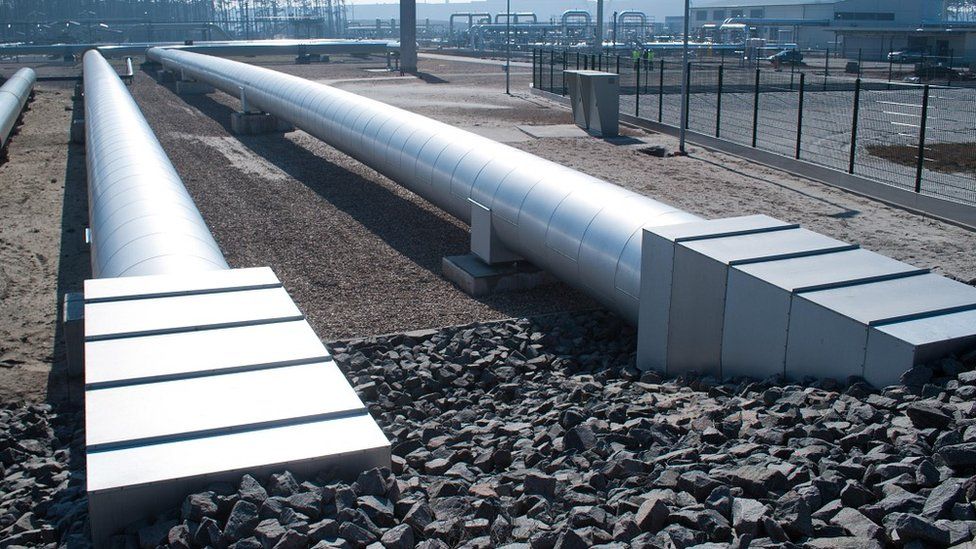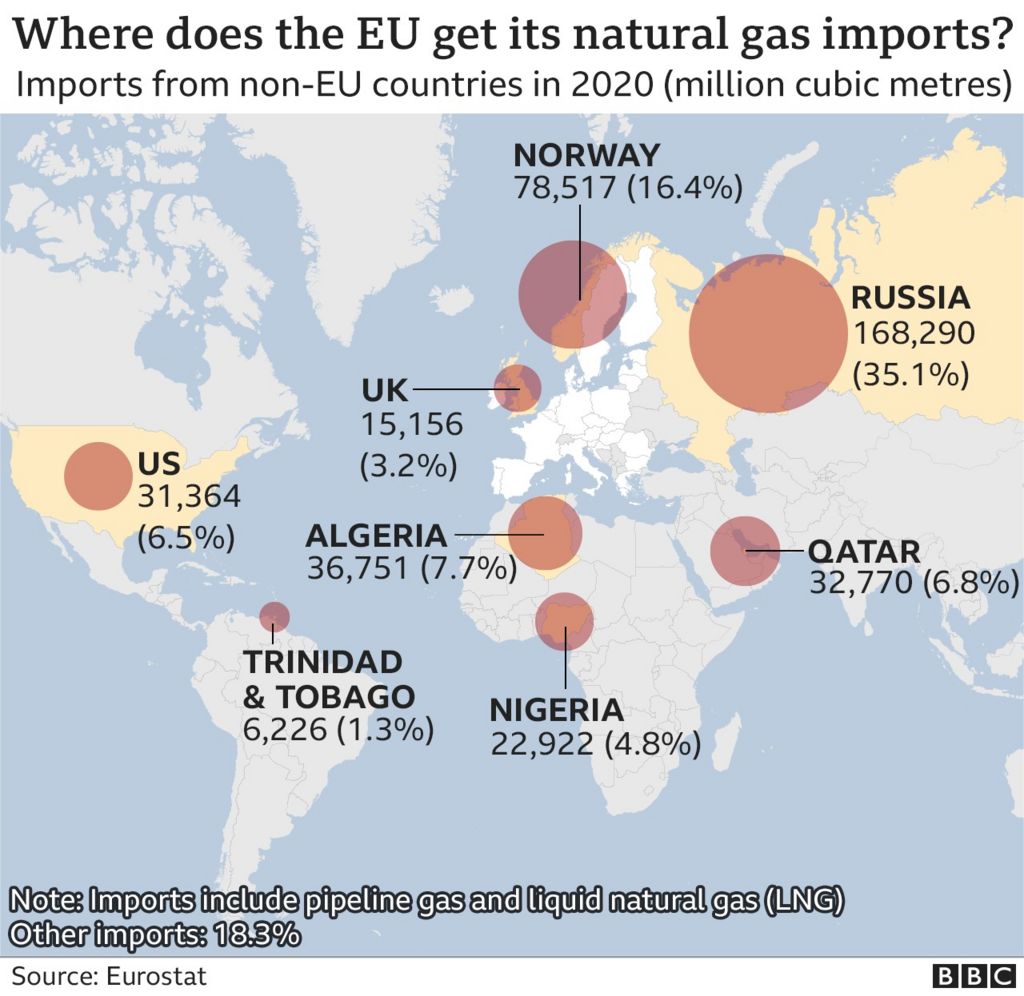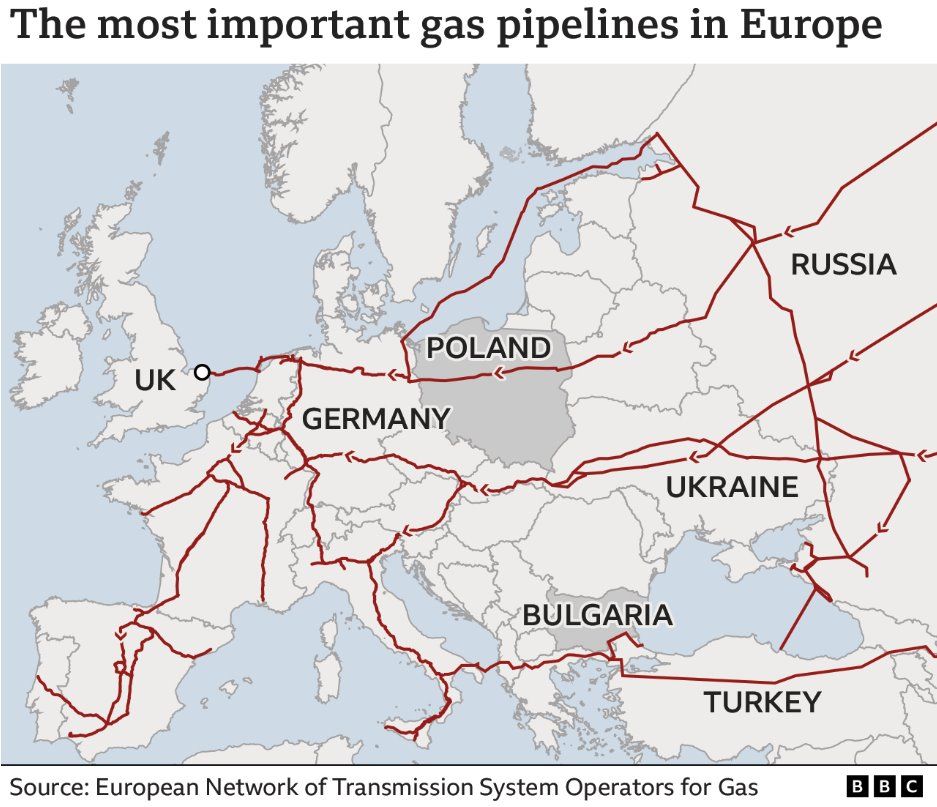 Alamy
AlamyRussia has resumed pumping gas to Europe through its biggest pipeline after warnings it could curb or halt supplies altogether.
The Nord Stream 1 pipeline restarted following a 10-day maintenance break but at a reduced level.
On Wednesday, the European Commission urged countries to cut gas use by 15% over the next seven months in case Russia switched off Europe’s supply.
Russia supplied Europe with 40% of its natural gas last year.
Germany was the continent’s largest importer in 2020, but has reduced its dependence on Russian gas from 55% to 35%. Eventually, it wants to stop using gas from Russia altogether.
Russia’s invasion of Ukraine in February sent wholesale gas prices soaring in Europe, with a knock-on impact on consumer energy bills.
The European Commission says retail electricity prices for households in EU capitals were up by 44% in May 2022, compared to May 2021. The highest rises were in the Netherlands (up 167%), Austria (up 122%) and Italy (up 118%).
Russia’s President Vladimir Putin has sought to play down fears, promising that state gas firm Gazprom would fulfil all its contractual obligations. His spokesman, Dmitry Peskov, denied that Russia was using gas for political blackmail.
But the pipeline is only delivering 40% of its capacity, and the head of Germany’s network regulator warned that the resumption of gas flows was not a sign that tensions were easing.
“The political uncertainty and the 60% cut from mid-June unfortunately remain,” Klaus Müller said on Twitter.
Gazprom cut the flow of gas through Nord Stream 1 last month, blaming the delayed return – due to sanctions – of a key piece of equipment which had been serviced in Canada.
The turbine is now believed to be on its way back to Russia, but President Putin recently said that if it is not returned, supply would have to be reduced further.
He has also pointed out that another machine is due to be sent for service soon, according to Russia’s Tass news agency.


The gas is flowing again – but at a reduced capacity.
Few in Berlin, or any other European capital, trust Vladimir Putin to supply the energy upon which Germany, in particular, depends so heavily.
Even as Europe swelters through a heatwave, ministers here are painfully aware that the country doesn’t currently have enough stored gas to see it through the winter.
They’re urging people to save energy, scrambling to secure supplies of liquified natural gas (LNG) from other countries and even firing up old coal power stations – despite a pledge to phase out the fossil fuel.
Industry leaders have warned that a shortfall in gas, which may yet lead to rationing, could trigger a recession.
That would delight Vladimir Putin, who wants to provoke political and economic chaos in the West.

The continued reduction in gas supply through Nord Stream 1 is likely to make it more difficult for countries to replenish their stores before winter, when gas usage is much higher.
Gazprom has cut gas supplies altogether to Bulgaria, Denmark, Finland, the Netherlands and Poland, over their refusal to comply with a Kremlin order to pay their bills in roubles, instead of euros or dollars.
European countries have been looking for alternative suppliers of gas, for example LNG from the US, which can be transported by ship.
But building the infrastructure needed to import gas from new suppliers can be expensive and time-consuming, which makes it unlikely that Russian gas can be replaced completely before the coming winter.
Instead, it may be necessary to cut gas consumption, and on Wednesday the EU Commission President, Ursula von der Leyen, announced a voluntary target for all EU countries to reduce their gas use by 15%.

In late February, in response to Russia’s invasion of Ukraine, Germany abruptly halted plans to open a new pipeline – Nord Stream 2 – which would double the supply of Russian gas to Germany.
Critics of the Nord Stream 2 project had long argued that it would give Russia too much control over Europe’s energy supply.









